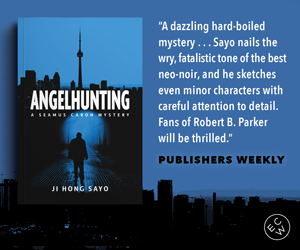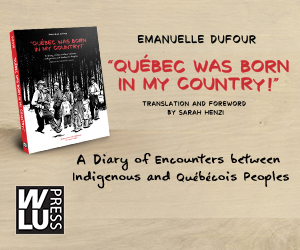"I Wanted This to Be About a Specific Third Culture Kid" June 2019 writer-in-residence Zalika Reid-Benta on her Stunning New Story Collection
We are extremely excited to announce that Zalika Reid-Benta, author of Frying Plantain (House of Anansi Press) is our June 2019 writer-in-residence.
Frying Plantain, Reid-Benta's brand new book of short stories, is a show-stopping debut collection, delving into family pressures and control, experiences of identity in immigrant families, and life as a young Black woman in Toronto.
The stories are linked, following Kara Davis, who feels tension between her Canadian and Jamaican identities as she grows up in the Eglinton West neighbourhood. From cruel pranks at school to travels to Jamaica to visit family, Kara is an irresistible character as she searches and grows - she's bright, real, and caught between complex and demanding pressures.
We're thrilled to introduce Zalika here today (and for those of you who already know her and her work know you're in for a treat) and we can't wait to share her voice on Open Book on our writer-in-residence page starting in June.
Be sure to stay tuned for her WIR posts, and in the meantime you can learn about her stunning collection, her writing process, and more. She tells us today about "meeting" Kara all the way back in high school, the thematic importance of food and "the ceremony of dining together" in the stories, and the recent Canadian collection she loved as a reader.
Open Book:
How did you decide what stories to include in the collection? When were they written?
Zalika Reid-Benta:
Writing the stories definitely wasn’t a linear process. I always say the forerunner to the collection was a story I wrote in the twelfth grade called “The Building Blocks”, which was how I got these characters and the way I wanted to write the neighbourhood of Eglinton West out. With some encouragement from mentors I had in undergrad, I wrote another story, which is now called “Frying Plantain”, which explored those characters more and I used that story as my submission to the MFA program and there, I wrote about 97% of my collection and then around three years after that, after taking a long break from writing the collection, I wrote the remaining 3% (my math is terrible so that’s probably not completely accurate but you get the gist!) after a five-week residency at the Banff Centre. In terms of what stories to include in the collection, to be honest I’m a very compact writer so for the longest time, my collection was only about 100 pages, I never really had an issue of figuring out what to keep and what to take out, I had to figure out what to add and before I wrote the 3%, my collection was a little stifling because it was so closely related to the family and there wasn’t enough of Kara’s life outside of her mother and grandmother and I think it took that time away from the collection for me to really see that she needed more time with her friends or a story about her first kiss or even a mention of university/the future.
OB:
What do the stories have in common? Do you see a link between them, either structurally or thematically?
ZR-B:
The most obvious thing they have in common is Kara, we’re following her throughout her coming-of-age and so the themes that go with coming-of-age like independence and individuality and new experiences permeate the collection. I also hope that the diaspora, specifically the Jamaican/Caribbean diaspora, is there throughout the book whether it’s through the food or through the location or through the certain slang being used, I very much wanted this to be about a specific third culture kid.
OB:
How did you decide which story would be the title story of your collection? Why that story in particular?
Your CanLit News
Subscribe to Open Book’s newsletter to get local book events, literary content, writing tips, and more in your inbox
ZR-B:
There are a lot of tensions between the family throughout the collection, a lot of arguments whether they’re silent or verbal, but food and the making of food, the ceremony of dining together and eating that food is when a lot of levity happens in the book, when a lot of connection is made in the book, food also becomes symbolic of heritage and of culture and of this family’s particular history, which is made most clear in the titular story “Frying Plantain” especially since the frying of the plantain is how two characters move past an ugly incident that happened in the past even if it’s only for that day and I find those moments to be the heart of the collection so I wanted to name it after the heart, after the levity, as opposed to the tensions. In terms of why it was plantain, I will say the biggest similarity Kara and I share is that fried plantain is one of our favourite foods!
OB:
Do you think your characters have anything in common with each other, from story to story?
ZR-B:
In terms of the neighbourhood friend group, I think what they all have in common is that they’re all “showing face”, they’re all putting on some sort of act, they’re all doing their best to fit in and to follow these preteen/teenhood rules that sort of just exist like law despite the fact that none of them really know who created these rules. In terms of the family, I think everyone is searching for some sort of peace within the family unit.
OB:
Did you do any specific research for any of your stories? Tell us a bit about that process.
ZR-B:
The Toronto I’m writing about does not really exist anymore. The timeframe is around the late ’90s to the early ’00s and so much about this city has changed since then and so in terms of location and setting, I worked a lot off of memory but memory can be fuzzy or deceiving so I would try to find images of what streets and malls looked like back then, if I was right in thinking there was a Cultures in Yorkdale, if I could find the name of a particular clothing store that I know existed on Eglinton West but that I can’t remember, and to be honest it wasn’t that easy to find, most photos are of the downtown core.
OB:
What was the strangest or most memorable moment or experience during the writing process for you?
ZR-B:
Finishing it! The hardest part for me when it comes to writing is the ending of a story or an ending of a chapter, I suck at them and I hate them so for a very long time, my stories don’t feel complete or finished and after finishing my MFA, while I certainly felt done with my collection, it didn’t feel finished and that sense of incompleteness was something I’d grown accustomed to, so actually writing those other stories, putting them in my collection and feeling like it was finally finished, was strange in the best way.
OB:
Do you have a favourite short story collection that you've read? Tell us why it is special to you.
ZR-B:
Carrianne Leung’s That Time I Loved You is definitely a favourite. I really admire her writing style and I love books that remind me of movies and so I really enjoyed the sort of Blue Velvet-esque not-everything-is-what-it-seems in this suburbia kind of feel to it. It’s such a gripping collection, I got lost in it immediately and as a lover of Korean dramas, when she told me that one had inspired her title, I kind of lost my mind!
_________________________________________
Zalika Reid-Benta is a Toronto-based writer whose work has appeared on CBC Books, in TOK: Writing the New Toronto, and in Apogee Journal. In 2011, George Elliott Clarke recommended her as a “Writer to Watch.” She received an M.F.A. in fiction from Columbia University in 2014 and is an alumnus of the 2017 Banff Writing Studio. She completed a double major in English Literature and Cinema and a minor in Caribbean Studies at University of Toronto’s Victoria College. She also studied Creative Writing at U of T’s School of Continuing Studies. She is currently working on a young-adult fantasy novel drawing inspiration from Jamaican folklore and Akan spirituality.




